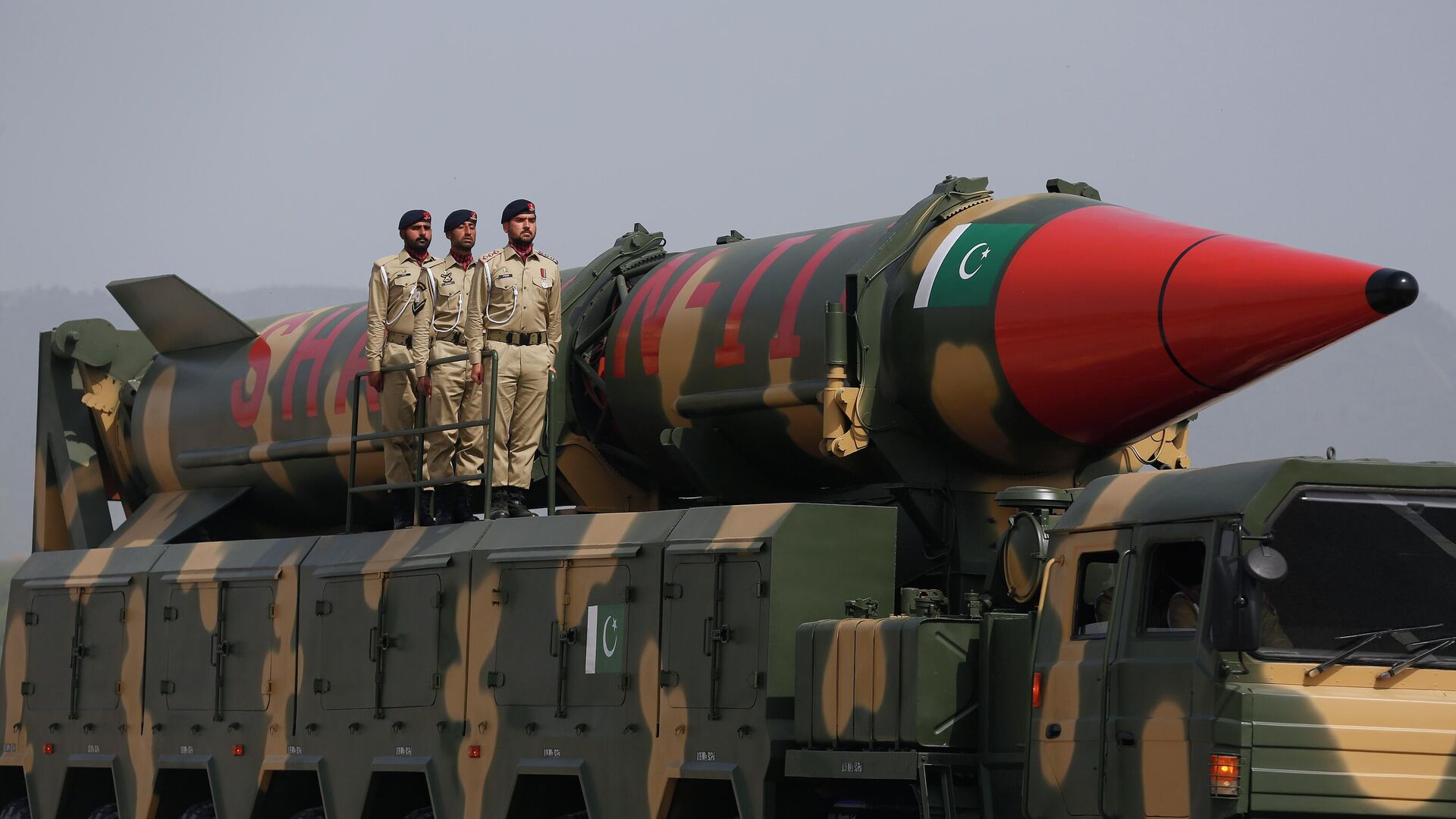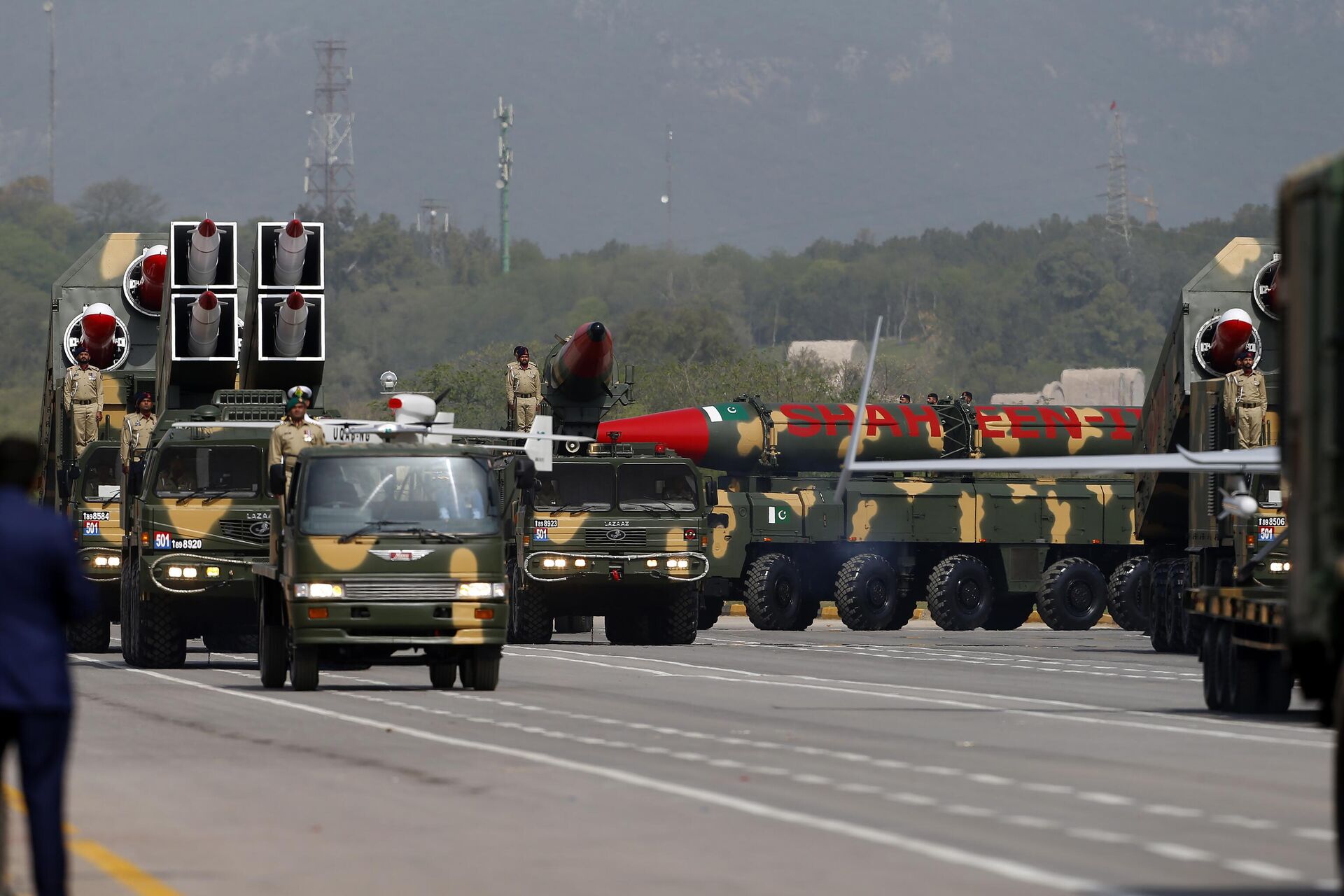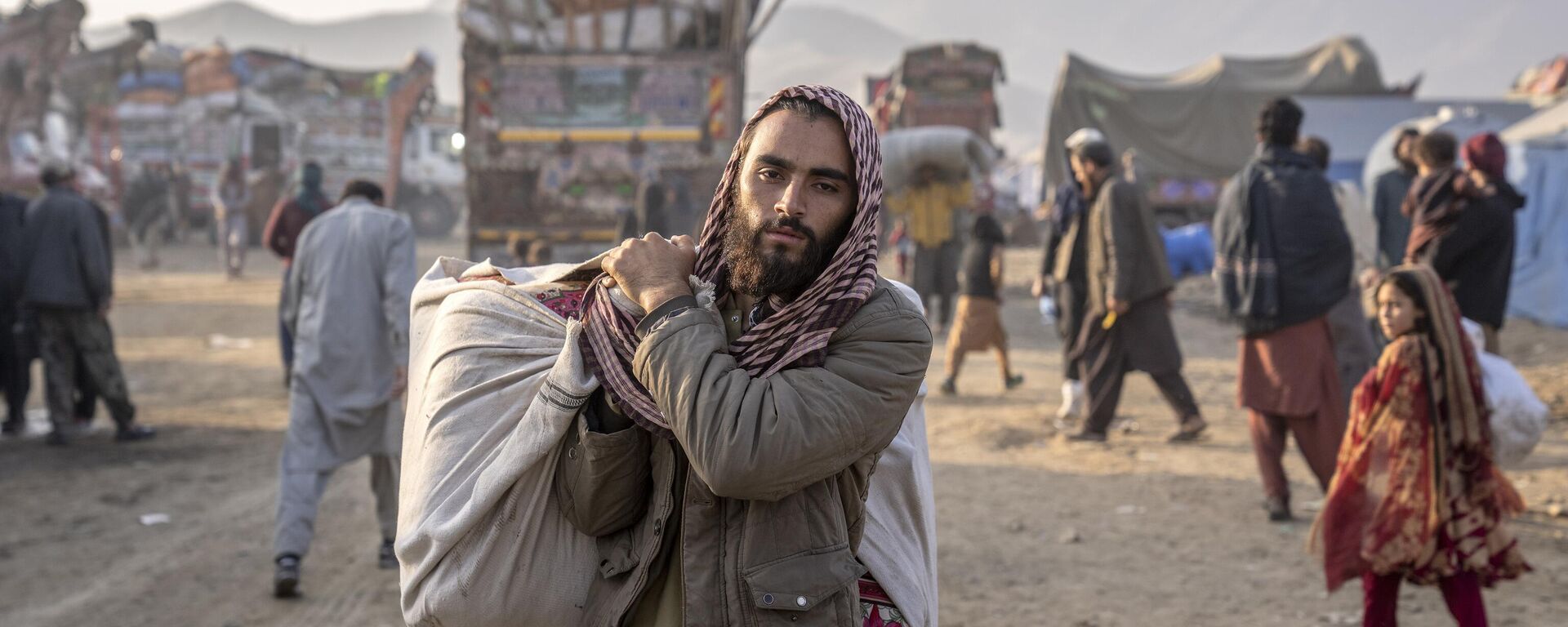https://sputniknews.in/20240619/what-drives-pakistans-growing-nuclear-arms-expenditure-7653776.html
What Drives Pakistan's Growing Nuclear Arms Expenditure?
What Drives Pakistan's Growing Nuclear Arms Expenditure?
Sputnik India
Islamabad is one of the major spenders on nuclear weapons, with the world’s nine nuclear-armed countries collectively spending $91 billion on their arsenals last year, a recent report has stated.
2024-06-19T16:29+0530
2024-06-19T16:29+0530
2024-06-19T21:28+0530
nawaz sharif
pakistan
india
islamabad
nuclear weapons
national security
defense sector
self-defense
https://cdn1.img.sputniknews.in/img/07e6/0c/13/153231_0:0:3073:1728_1920x0_80_0_0_2d7eb10ae181d8302cb7c713d5e2d792.jpg
Nuclear nations have increased spending on their arsenals by 33% over the past five years as they update their stockpiles, a report from the International Campaign to Abolish Nuclear Weapons (ICAN) has indicated.One of those is Pakistan, whose story of nuclear weapon acquisition is unparalleled. Today, the country continues to gradually expand its atomic arsenal with more warheads, delivery systems, and a growing fissile material production industry.In a conversation with Sputnik India, security analyst and contributor to the Institute of Strategic Studies Islamabad, Shahid Abdul, said that Pakistan's journey to acquire nuclear weapons was marked by "determination, secrecy, and strategic maneuvering that reshaped South Asian dynamics".Shedding light on why the state is currently growing its atomic arsenal, the analyst explained that it is a quest for security in a volatile region.Keeping Foes at BayThe nuclear standoff between the two neigbors dates back to their overt tests in 1998, which established them as nuclear-armed states. Since, Pakistan has pursued a policy of maintaining a 'minimum credible deterrence', a concept aimed at deterring potential aggression by displaying the capability to inflict nuclear damage on any aggressor.According to the analyst, in recent years, the nation's nuclear posture has evolved, as there are indications that the country is not only maintaining, it is also enhancing its arsenal in terms of both quantity and quality.The analyst further added that despite efforts to engage in dialogue and diplomatic measures, the strategic rivalry between India and Pakistan persists, marked by border clashes and ongoing disputes over Kashmir.However, Islamabad's policy is also influenced by its broader environment which contributed to the state's security calculus – instability in neighboring Afghanistan, the rise of multiple terrorist organizations in the region, and concerns over US policies in the region.Hence, nuclear weapons are viewed as a safeguard against both conventional military threats and unconventional security challenges.Implications of Pakistan's Increased ArsenalThe analyst said that on the positive side, a robust atomic deterrent enhances Pakistan's national security by providing a credible barrier against external threats.However, there are also some challenges associated with nuclear escalation. Economically, diverting resources towards atomic weapons development and maintenance comes at a high cost, and that can potentially deflect funds from other vital sectors such as education, healthcare, and infrastructure development.According to Abdul, Pakistan also faces international pressure regarding its program, particularly concerning non-proliferation norms and practices.As a nuclear-armed state outside the Nuclear Non-Proliferation Treaty (NPT), Pakistan's actions influence global perceptions of nuclear stability and disarmament. In 1968, when the NPT was finalized, the country had a favorable attitude towards the document; however, it ultimately refused to sign the treaty because India did not sign it.Hence, efforts to prevent the spread of nuclear weapons face challenges when certain nations continue to enhance their arsenals.Nevertheless, as pointed out by the security analyst, the nuclear deterrent between India and Pakistan, often referred to as the "balance of terror," has prevented direct conflict between the two nuclear-armed neighbors despite frequent tensions.Remarkable Journey to Nuclear ClubPakistan's nuclear ambitions can be traced back to its inception in 1947. Dr. Abdus Salam, a Nobel laureate in physics, played a pivotal role in laying the groundwork for the nation's scientific community. His efforts were bolstered by the establishment of the Atomic Energy Commission (PAEC) in 1956, which aimed to harness nuclear technology for peaceful purposes.The turning point came in the 1970s when India conducted its first nuclear test in 1974, codenamed "Smiling Buddha". This event fundamentally altered Pakistan's security calculus.Amid regional tensions and a perceived existential threat, the country accelerated its nuclear program under the leadership of Prime Minister Zulfikar Ali Bhutto, who famously said that Pakistanis would "eat grass" if necessary, but would develop nuclear weapons.In the 80s, key figures like Dr. Abdul Qadeer Khan, who was studying in Amsterdam as a metallurgist, received expertise in uranium enrichment, and later played a clandestine role in acquiring critical technologies through a network that spanned from Europe to Asia. This covert acquisition not only fueled technological advancements but also triggered international scrutiny.However, the culmination of Pakistan's nuclear quest came in May 1998 when it conducted a series of atomic tests in the remote area of Balochistan. These tests, conducted under the leadership of Prime Minister Nawaz Sharif, marked the state's formal entry into the nuclear club.
https://sputniknews.in/20240306/afghan-army-chief-hits-out-at-pakistan-calls-durand-line-imaginary-6753653.html
pakistan
india
islamabad
Sputnik India
feedback.hindi@sputniknews.com
+74956456601
MIA „Rossiya Segodnya“
2024
Aneela Rashid
https://cdn1.img.sputniknews.in/img/07e6/0c/0d/74548_0:0:485:484_100x100_80_0_0_821526e967ae85d041e2d30ee34fa1de.jpg
Aneela Rashid
https://cdn1.img.sputniknews.in/img/07e6/0c/0d/74548_0:0:485:484_100x100_80_0_0_821526e967ae85d041e2d30ee34fa1de.jpg
News
en_IN
Sputnik India
feedback.hindi@sputniknews.com
+74956456601
MIA „Rossiya Segodnya“
Sputnik India
feedback.hindi@sputniknews.com
+74956456601
MIA „Rossiya Segodnya“
Aneela Rashid
https://cdn1.img.sputniknews.in/img/07e6/0c/0d/74548_0:0:485:484_100x100_80_0_0_821526e967ae85d041e2d30ee34fa1de.jpg
nawaz sharif, pakistan, india, islamabad, nuclear weapons, national security, defense sector, self-defense
nawaz sharif, pakistan, india, islamabad, nuclear weapons, national security, defense sector, self-defense
What Drives Pakistan's Growing Nuclear Arms Expenditure?
16:29 19.06.2024 (Updated: 21:28 19.06.2024) Pakistan is one of the major spenders on nuclear weapons, with the world’s nine nuclear-armed countries collectively spending $91 billion on their arsenals last year, a recent report has stated.
Nuclear nations have increased spending on their arsenals by 33% over the past five years as they update their stockpiles, a report from the International Campaign to Abolish Nuclear Weapons (ICAN) has indicated.
One of those is Pakistan, whose story of
nuclear weapon acquisition is unparalleled. Today, the country continues to gradually expand its atomic arsenal with more warheads, delivery systems, and a growing fissile material production industry.
In a conversation with
Sputnik India, security analyst and contributor to the
Institute of Strategic Studies Islamabad,
Shahid Abdul, said that Pakistan's journey to acquire nuclear weapons was marked by "determination, secrecy, and strategic maneuvering that reshaped
South Asian dynamics".
Shedding light on why the state is currently growing its atomic arsenal, the analyst explained that it is a quest for security in a volatile region.
"Pakistan's nuclear program has historically been framed around maintaining a credible deterrence capability against its neighbor, India. Similarly, India is also growing its arsenal rapidly with reports suggesting that India now has more nuclear weapons than Pakistan for the first time,” Abdul claimed.
The nuclear standoff between the two neigbors dates back to their overt tests in 1998, which established them as nuclear-armed states. Since, Pakistan has pursued a policy of maintaining a 'minimum credible deterrence', a concept aimed at deterring potential aggression by displaying the capability to inflict nuclear damage on any aggressor.
According to the analyst, in recent years, the nation's nuclear posture has evolved, as there are indications that the country is not only maintaining, it is also
enhancing its arsenal in terms of both quantity and quality.
"This enhancement may include advancements in delivery systems, such as ballistic missiles and potentially tactical nuclear weapons, designed to be used on the battlefield," Abdul stated.
The analyst further added that despite efforts to engage in dialogue and diplomatic measures, the
strategic rivalry between India and Pakistan persists, marked by border clashes and ongoing disputes over
Kashmir.
"Pakistan sees nuclear weapons as a critical deterrent against any potential military aggression from India, particularly in light of India's conventional military superiority," the analyst added.
However, Islamabad's policy is also influenced by its broader environment which contributed to the state's security calculus – instability in neighboring Afghanistan, the rise of multiple terrorist organizations in the region, and concerns over US policies in the region.
Hence, nuclear weapons are viewed as a safeguard against both conventional military threats and unconventional security challenges.
Implications of Pakistan's Increased Arsenal
The analyst said that on the positive side, a robust atomic deterrent enhances Pakistan's national security by providing a credible barrier against external threats.
"It bolsters the country's defense stance and strengthens its ability to protect its sovereignty and territorial integrity," the analyst argued.
However, there are also some challenges associated with nuclear escalation. Economically, diverting resources towards atomic weapons development and maintenance comes at a high cost, and that can potentially deflect funds from other vital sectors such as education, healthcare, and infrastructure development.
According to Abdul, Pakistan also faces international pressure regarding its program, particularly concerning non-proliferation norms and practices.
"The international community remains vigilant about Pakistan's nuclear position, urging transparency and responsible handling," the analyst said.
As a nuclear-armed state outside the Nuclear Non-Proliferation Treaty (NPT), Pakistan's actions influence global perceptions of nuclear stability and disarmament. In 1968, when the NPT was finalized, the country had a favorable attitude towards the document; however, it ultimately refused to sign the treaty because India did not sign it.
Hence, efforts to prevent the spread of nuclear weapons face challenges when certain nations continue to enhance their arsenals.
Nevertheless, as pointed out by the security analyst, the nuclear deterrent between India and Pakistan, often referred to as the "balance of terror," has prevented direct conflict between the two nuclear-armed neighbors despite frequent tensions.
Remarkable Journey to Nuclear Club
Pakistan's nuclear ambitions can be traced back to its inception in 1947. Dr. Abdus Salam, a Nobel laureate in physics, played a pivotal role in laying the groundwork for the nation's scientific community. His efforts were bolstered by the establishment of the Atomic Energy Commission (PAEC) in 1956, which aimed to harness nuclear technology for peaceful purposes.
The turning point came in the 1970s when India conducted its first nuclear test in 1974, codenamed "Smiling Buddha". This event fundamentally altered Pakistan's security calculus.
Amid regional tensions and a perceived existential threat, the country accelerated its nuclear program under the leadership of Prime Minister Zulfikar Ali Bhutto, who famously said that Pakistanis would "eat grass" if necessary, but would develop nuclear weapons.
In the 80s, key figures like Dr. Abdul Qadeer Khan, who was studying in Amsterdam as a metallurgist, received expertise in uranium enrichment, and later played a clandestine role in acquiring critical technologies through a network that spanned from Europe to Asia. This covert acquisition not only fueled technological advancements but also triggered international scrutiny.
However, the culmination of Pakistan's nuclear quest came in May 1998 when it conducted a series of atomic tests in the remote area of Balochistan. These tests, conducted under the leadership of Prime Minister Nawaz Sharif, marked the state's formal entry into the nuclear club.




